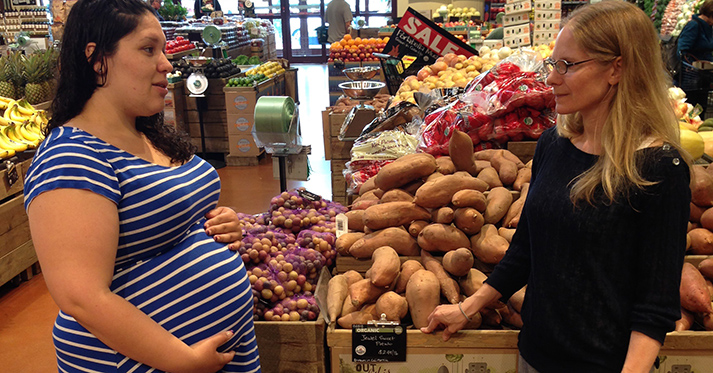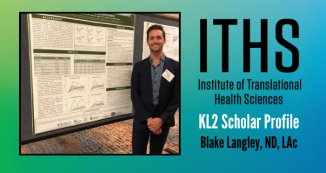
03 Aug ITHS Regional Translational Scholar Looks at Role of Organic and Conventional Diets During Pregnancy
Women receive an ample amount of advice during pregnancy, and a lot of it is contradictory. Some say to avoid alcohol completely; others say a small amount later in a pregnancy is fine. Exercise is okay, but don’t overdo it. Eat a balanced diet, but avoid unpasteurized cheeses, deli meats, and some kinds of fish.
One area that doctors and expecting mothers both contend with is the decision to eat organic or conventional food during pregnancy. Like alcohol, exercise, and soft cheese, there have been some studies and a lot of speculation. But there is currently no conclusive evidence to help guide women during their pregnancies.
Dr. Cynthia Curl, an ITHS Research Scholar and assistant professor in the Department of Community and Environmental Health at Boise State University, hopes her pilot study can bright some clarity to the conversation.
“Our research question is whether or not we can find a measurable difference in pesticide exposure among pregnant women, dependent on whether they eat conventional or organic produce throughout their second and third trimesters,” Curl said.
The study will follow 20 women from Idaho’s Treasure Valley through their second and third trimesters. Curl currently has 13 participants and hopes to have the full cohort by the end of the summer.
The Regional Translational Scholars program makes me feel connected to a larger network of researchers that I can call upon. I think I would feel isolated without that.
Before they begin the intervention, each participant will provide a baseline urine sample. Participants will then be randomly assigned to the organic group or the conventional group. For the next 24 weeks, participants will receive a weekly delivery of fruits and vegetables from Curl’s lab. During these deliveries, the research team will collect a urine sample.
Participants are also asked to record all fruits and vegetables they eat during the six month study, including produce that was not provided by Curl’s lab. Using a phone app, participants are instructed to take a photo of any dish that includes fruits and vegetables and record if it was conventional or organic. “Ultimately, we’ll know how many servings of conventional or organic fruits and vegetables they eat,” Curl said.
At the end of the study, Curl will analyze 25 urine samples from each participant for 13 different metabolites that represent exposure to agricultural pesticides. “These pesticides are not commonly used in residential settings and none of these participants work with pesticides,” Curl said. “That will tell us how much of a difference our dietary intervention has made.”
Curl describes the pilot study as “an exercise in logistics and feasibility.” Her goal is to convert this pilot research into a larger, long project. That future study would follow the children for two years to identify any differences in cognitive performances associated with maternal diet during pregnancy.
Curl’s work is supported by the ITHS Regional Translational Scholar program, which provides early stage investigators in the WWAMI-region with a career development package for two years. Curl said that the mentorship and collaboration with investigators who share her research interests have been the highlights of the program.
Her mentor is Dr. Catherine Karr, a pediatric environmental medicine specialist and environmental epidemiologist at the University of Washington. “By having her be my official mentor through the program, it gives her an investment in what I’m doing,” Curl said. “We have monthly calls, and I get her input. I also have people to help review my ultimate proposal. [The Regional Translational Scholar program] makes me feel connected to a larger network of researchers that I can call upon. I think I would feel isolated without that.”







